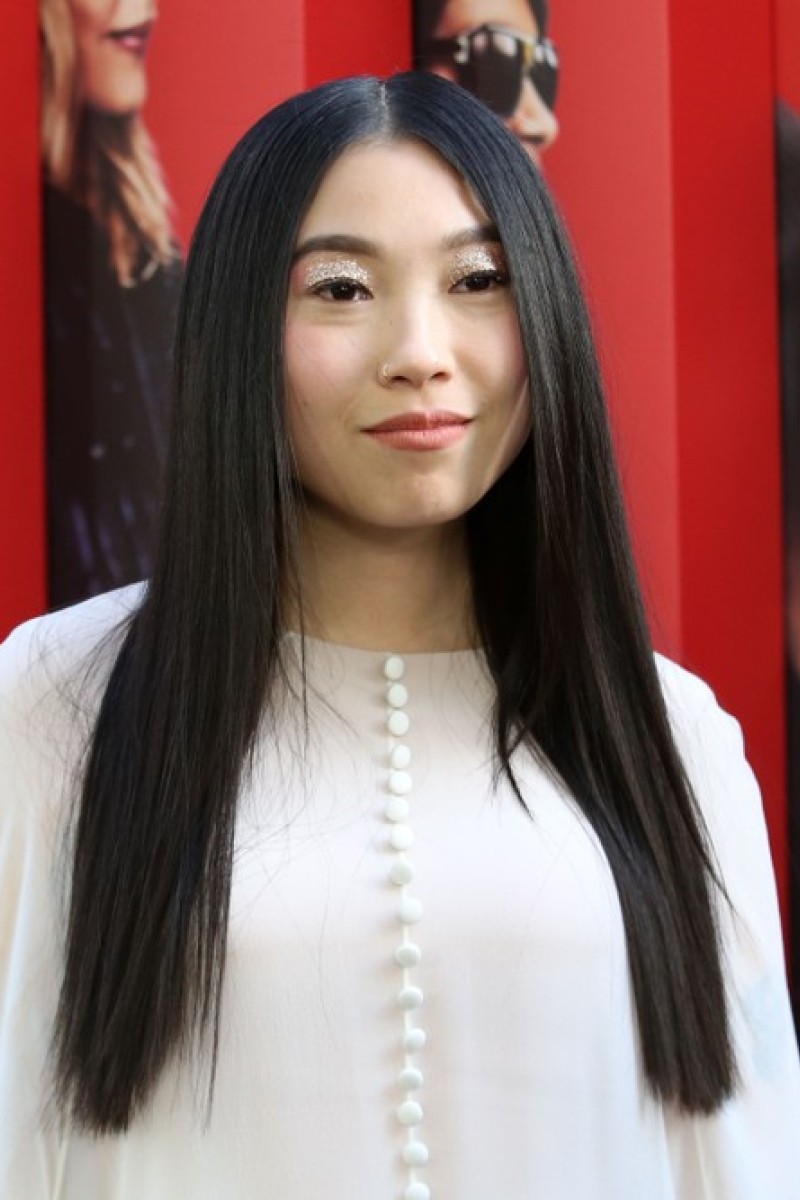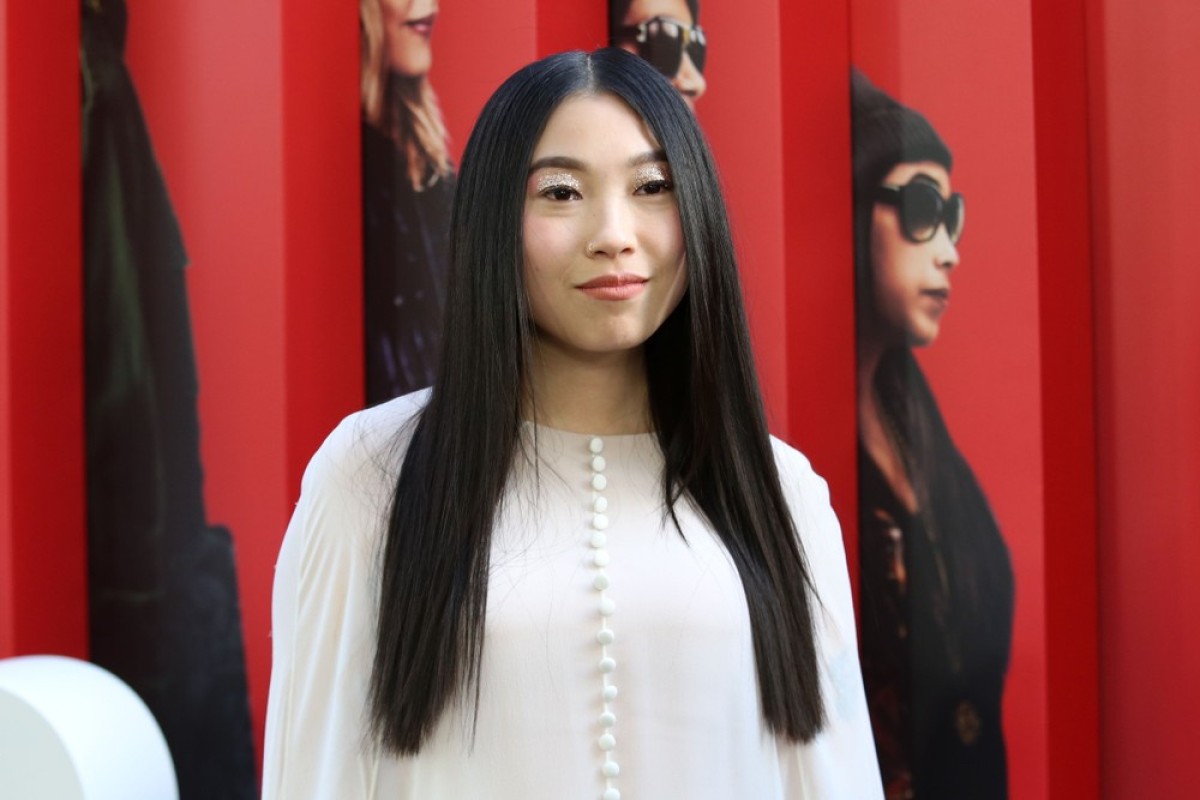
'Crazy Rich Asians' breakout star Awkwafina is here to steal scenes, change how you see Asian Americans, and be unforgettable
 Awkwafina plays Peik Lin in Crazy Rich Asians.
Awkwafina plays Peik Lin in Crazy Rich Asians.She was filming a scene with Rihanna for Ocean’s 8 in the New York Times building, as one does, and when she walked outside, it was nighttime in the city where she grew up. It was beautiful and crisp and clear, and when she looked up, she saw it: The office where she used to work. The one she would take the subway to every morning, hating herself. The office where she got fired.
Back then, the rapper-actress-comedian went by her real name, Nora Lum, and although she admits she was “a (bad) publicist,” getting canned still didn’t feel good. “I felt disgrace from being fired from that,” she said. “It was at a time when my dad, no one, really believed that Awkwafina would be a thing.”
It was under the name Awkwafina that she released a music video in direct response to a Mickey Avalon song. The video went viral. Nora Lum’s boss sent her packing.
Crazy Rich Asians star Constance Wu calls movie historic: 'We all have a story'
That was in 2012. In 2018, Awkwafina, now 30, released a critically acclaimed hip-hop EP, In Fina We Trust, and is charming the masses in two of the summer’s biggest films: As a scammer-slash-pickpocket in the aforementioned heist flick, and in Crazy Rich Asians. In the latter, she’s the primary scene stealer as Peik Lin, the uber-wealthy, borderline-manic best friend to the romantic heroine, and carries herself as though nobody told her that she’s not the star of the movie.
Director Jon Chu has admitted that when he cast Awkwafina, he “had no idea whether it was going to work. I was like, ‘This will either ruin the movie or take the movie to another level.’ But she knew exactly what she was doing.”
“I think it’s so exciting when you get to watch a star right before they explode. And this is what we’re seeing (with Awkwafina)," said Elaine Lui, a celebrity expert and founder/editor of LaineyGossip.com. “That is what Hollywood is built on: the moment a star arrives.”
Meet the Asian authors that are advocating for change and inspiring young readers
Only two weeks after she found out she’d got cast, Awkwafina was on a plane to Singapore to start filming. “When you’re Asian American or Asian Australian or Asian Briton, and you go back to Asia, there’s always a very personal journey that takes place,” she said. “And I think that we were all the tokens, at some point. We were all that one Asian on set. And that dynamic just didn’t exist.”
With the Crazy Rich Asians cast, she said, “I felt like I’d known these people my whole life.”
Awkwafina was five years old when The Joy Luck Club hit theatres in 1993. In the quarter-century since, of the very few major Hollywood studio films featuring majority-Asian casts, all were set in the past. Crazy Rich Asians is the first to treat its characters not as historical subjects but as actual people living in the present day.
“I think I definitely clocked that this had never happened, and I never thought it would ever happen in my career,” she said.
Letters from the dorm: Asians are still being stereotyped in Hollywood – and it’s 2018
Surely this was not the inner monologue of, say, Tom Hardy, gazing across the set of Dunkirk: “I never thought I’d get to be in a movie with so many white men, written by a white man, and directed by a white man.”
It can be tempting, in a stretch that’s seen the box office triumphs of Black Panther, Coco, Get Out, Girls Trip and Wonder Woman (not to mention Ocean’s 8), to feel as though inclusion is the new normal. But Hollywood is no more diverse now than it was a decade ago, on screen or off. The new normal looks an awful lot like the old normal. It does not look very much like Crazy Rich Asians. Not yet, at least.
Lui gets emotional talking about this movie, about seeing people cry at screenings. “A lot of people in the Asian community have felt after watching this movie, or while they’re watching this movie, that they’re being seen for the very first time,” she said.
It’s not that Crazy Rich Asians is a tear-jerker. Just the opposite. Based on Kevin Kwan’s bestselling novel of the same name, the film is a luscious, glittery, love story. “I think the emotion comes from the fact that the movie is so joyful,” Lui said. “Ironically, it makes you emotional because these are happy, joyful people. They’re living big lives. . . . Being Asian, that, too, is not something we see in an English-language film, to see us represented in that way. [To see us] not recovering from a war, [or feeling] sadness because of whatever you discovered in your ancestry. Those are valid stories, too. But these are just modern Asians who are out there living their best life.”
The complex history of Asian Americans in films, from the silent era to Crazy Rich Asians
When Awkwafina was watching her dailies on set with Chu (a playback of that day's footage), she also cried. “I think it was in that moment that I realised what we were doing there,” she said. “When you’re filming a movie, you don’t understand the impact yet. But it was an impactful moment for me. ”
Awkwafina was born to a Chinese American father and a South Korean immigrant mother who died when she was four. She says it was her grandmother who really nurtured her to be funny and outgoing.
“I never cared about anything,” Awkwafina said. “I would do anything for a laugh. I would jump off a building for a laugh.” She also had “a love affair” with hip-hop. “It was my outlet for everything. Especially as kind of an angsty teen, I felt something extremely subversive about hip-hop that connected to me.”
Face Off: are Hong Kong people racist?
At LaGuardia High School, the performing arts academy (other notable alumni: Timothée Chalamet, Nicki Minaj, Ocean’s 8 castmate Sarah Paulson), she played the trumpet. She developed her alter-ego when she was about 15: a hyper-expressive public self who performs in a way Nora Lum never would. “I think everyone has that duality inside us,” she said. “They have this overly confident person that they’d love to be, but can’t, because adulthood set in and they’re neurotic and really, really self-conscious. But Awkwafina, she doesn’t do that.”
“My dad is totally Americanised,” she said. “I didn’t even see the Asian dad part come out until I started doing Awkwafina, and he thought I was going through, literally, a quarter-life crisis kind of thing. He thought I was insane.” She set out to prove him wrong. She made Tawk, a scrappy web series in which she conducted interviews in bodegas, laundromats and subway cars. In 2014, she released her debut album, Yellow Ranger. She landed a spot on MTV’s humorous advice show Girl Code and parts in Neighbors 2: Sorority Rising and the Netflix stoner comedy Dude.
Awkwafina pieced together her path to success without any clear example to follow; it’s not like young Nora Lum could turn on the TV and see women who looked like her, doing what she wanted to do. She’d watch her childhood favourite movie, Air Bud (yes, the basketball-playing dog, what of it?) and think, wouldn’t that be so cool, if I was that kid? But she thought “it wouldn’t make any sense if I was that kid, because I wasn’t white,” she said.“ Her only ”guiding light“ was Margaret Cho, with whom she eventually collaborated on a song, Green Tea.
“When I was growing up, I was really looking for films like Crazy Rich Asians,’ said Awkwafina. “I was looking to see how dreams could materialise. Because if you don’t have that, how can you dream? . . . If you’re the first one doing all this stuff, there’s no road map for it. You can’t ask anyone for advice. Being the first, sometimes it’s really scary. But it’s really important, because it allows room for more.”
Crazy Rich Asians isn’t just a win for representation; it upends limiting, persistent stereotypes about who Asians are and can be. “The cast has talked about this all the time: When they’re in films, they’re doctors with clipboards, they’re accountants,” Lui said. "Here’s an Asian-American rapper who is a movie star, who swears, who talks about [her body]. That breaks the mould of so many expectations of what Asian women should be."
Awkwafina already has new projects lined up: hosting the iHeartRadio MMVAs on August 26, shooting sci-fi thriller Paradise Hills, voicing a character in The Angry Birds Movie 2. And she’s “feeling optimistic” about the direction of the industry.
Talking Points: how would you react to a racist comment in public?
“We [want] a Hollywood that represents the realities of the people that live in this country,” she said. “This movie, every movie that strays against the very old-timey narrative is a giant middle finger to any kind of ideas that we are not American, that we are all one colour, and all those things.”
And no offence to Nora Lum, but she plans to do this all under the name Awkwafina.
“I feel like any Asian American that’s doing it right now, they need to be remembered,” she said. “It’s imperative to be remembered. And when people see my name, they’re a mixture of confused, angry, distraught, disturbed - they don’t understand it at all. But it’s important, because they’ll never forget it. I need people to not forget me.”
